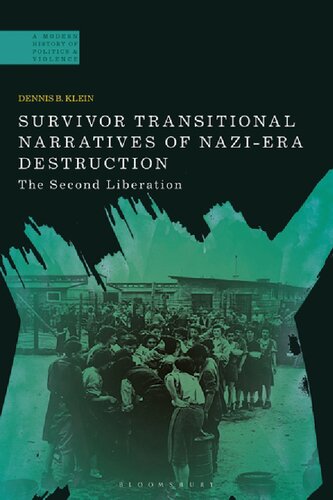Product desciption
Survivor Transitional Narratives Of Naziera Destruction The Second Liberation Dennis B Klein by Dennis B. Klein 9781350037144, 9781350037175, 1350037141, 1350037176 instant download after payment.
Survivor Transitional Narratives of Nazi-Era Destruction: The Second Liberation examines the historical circumstances that gave rise in the 1960s to the first cohort of Nazi-era survivors who massed a public campaign focusing on remembrance of Nazi racial crimes. The survivors’ decision to engage and disquiet a public audience occurred against the backdrop of the Frankfurt Auschwitz trial and the West German debate over the enforcement of statutory limitations for prosecuting former Nazis. Dennis B. Klein focuses on the accounts of three survivors: Jean Améry, an Austrian ex-patriot who joined the Belgian Resistance during the war, Vladimir Jankélévitch, a member of the French Resistance, and Simon Wiesenthal, who dedicated his life after the war to investigating Nazi crimes. As Klein argues, their accounts, in addition to acting as a reminder of Nazi-era endemic criminality, express a longing for human fellowshipThis contextual and interdisciplinary interpretation illustrates the explanatory significance of contemporary events and individual responses to them in shaping the memory and legacy of Nazi-era destruction. It is essential reading for students and scholars of the Nazi era and its legacy, genocide studies, Jewish Studies, and the history of emotions.
Survivor Transitional Narratives of Nazi-Era Destruction: The Second Liberation examines the historical circumstances that gave rise in the 1960s to the first cohort of Nazi-era survivors who massed a public campaign for memory and the future. The survivors’ decision to engage and disquiet a public audience occurred against the backdrop of The Frankfurt Auschwitz Trial (1963–5) and the West German debate over prescriptibility, or the enforcement, of the twenty-year statutes of limitations for prosecuting egregious Nazi crimes. Determined to resist, they produced a genre of narrative accounts committed to bearing witness as a reminder of Nazi-era endemic criminality.
By drawing on accounts written by Jean Améry, Vladimir Jankélévitch, and Simon Wiesenthal, this book argues that, in addition to condemning their contemporaries, forward-looking swerves in the form of allusions, dreams, and digressions reside in counter-narratives. Two complementary themes are notable: a desire for emotional freedom from what Améry called the “trap” of resentment, and a yearning for human fellowship. The book argues that pre-traumatic, ancestral conditions inspired the survivors’ search to renegotiate their place in a world which they had come to distrust. Over 150 years since their emancipation, west-central European Jews were emotionally attached to their neighbors—they felt, or wanted to feel at home, regardless of how their neighbors actually and, sometimes, fatally felt about them. The rupture that occurred with the campaign to destroy Jews fueled survivors’ conclusions about a broken world, observations that informed their strong, manifest narratives. But surprisingly, a residual zeal for a human connection survived in counter-narratives. If there is emotional despair in survivors’ accounts, it is leavened by transitional narratives that sought to rework social relationships.
This is an important book for students and scholars interested in the history of the emergence of Nazi-era survivors’ in the 1960s, and their conceptions of relationships between adversaries in the aftermath of atrocity.


